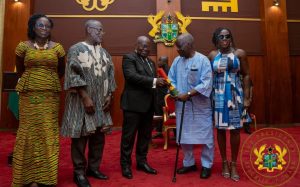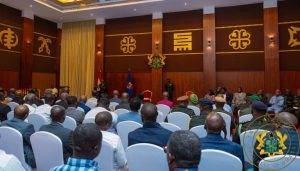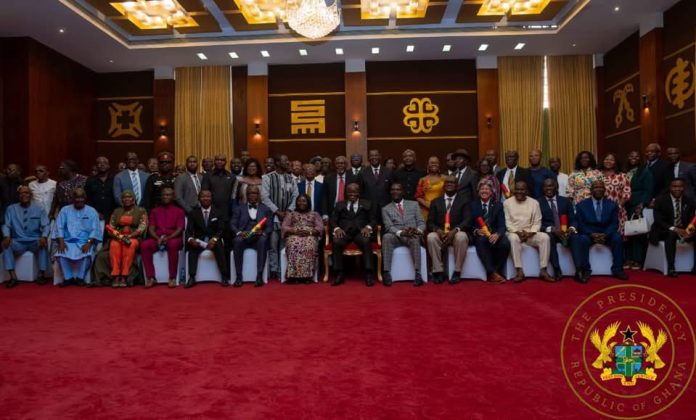The President, Nana Addo Dankwa Akufo-Addo, has granted presidential charters to 14 private University Colleges in Ghana.
The granting of the presidential charters is to empower these institutions to award degrees, diplomas and certificates independently, thereby enhancing their autonomy and capacity to innovate.
The Presidential Charters were given to these institutions on Thursday, December 19, 2024 at a colourful ceremony held at Jubilee House, Accra.

INSTITUTIONS
The 14 private university colleges that were granted the charters included; Academic City University College, Haatso-Accra; KAAF University College, FettehKakraba; Entrance University College of Health Sciences, Spintex-Accra; Garden City University College, Kenyase-Kumasi; Family Health University College, Teshie-Accra; Ensign Global College, Kpong; andThrivus Institute for Biomedical Science and Technology, Lashibi-Accra.
The rest are Heritage Christian University College, Amasaman-Accra; University College of Gold Coast (formerly known as Accra Business School), Spintex-Accra; Knutsford University College, East Legon-Accra; Nobel International Business School, South Legon-Accra; Accra Metropolitan University College (formerly known as Laweh University College), Nungua-Accra; African University College of Communications and Business (formerly known as African University College of Communications), Adabraka-Accra; and National Defence College (formerly known as Kofi Annan International Peace Keeping Training Centre and Ghana Armed Forces Command and Staff College), Teshie-Accra.
PERSEVERANCE
In his speech, President Akufo-Addo said the ceremony was an affirmation of the vision and perseverance that these institutions have demonstrated over the years.
He recalled the number of such institutions that had earlier been granted presidential charters, depicting his government as committed to continuously providing an enabling environment to see more university colleges becoming autonomous.
He acknowledged the journeys of these institutions and reflected on the significance of the achievement, as well as the profound impact it has on Ghana’s future.
He said that the grant of a presidential charter represents the highest recognition that a tertiary institution in Ghana can achieve.
He said, “The journey of these 14 institutions has been one of relentless effort and dedication.Through mentorship by established universities, they have built robust governance structures, invested in modern facilities, expanded their academic programs, and upheld the highest standards of teaching and research. This is not only a reflection of their commitment to quality education, but it’s also an acknowledgement of their contribution to the broader development of the nation.”

ENCOURAGEMENT
President Akufo-Addo encouraged the leadership of these institutions to embrace this new chapter with a renewed sense of purpose.
He told them to uphold the highest standards of academic integrity and foster an environment of inclusivity and diversity. And prioritise the holistic development of your students.
“Let your institutions be exemplars of excellence that inspire others to follow. The students and alumni of these institutions know that you are the torchbearers of this legacy. Strive to make the most of the opportunities afforded to you,” he remarked.
CRITERIA
A University College must follow a rigorous process and must meet stringent criteria established by the Ghana Tertiary Education Commission (GTEC).
These criteria include excellence in governance, quality assurance, academic delivery, research, and community engagement.
The tertiary education system in Ghana is composed of public and private institutions.
Public universities are established by acts of parliament with presidential assent to award their own degrees and diplomas.
On the other hand, private university colleges go through periods of academic mentorship and supervision by mentoring public institutions for the award of degrees and diplomas.
Until recently, private university colleges, after 10 years of having demonstrated sufficient capacity in governance, finances, academic matters, and infrastructural development, could then apply to the National Accreditation Board for a presidential charter to enable them to award their own degrees and diplomas.
However, following the creation of the Ghana Tertiary Education Commission under the Education Regulatory Bodies Act 2020 Act 1023, it is no longer mandatory for new tertiary education institutions to go into affiliation arrangements with existing chartered institutions to be accredited.
This means that new institutions will have to demonstrate their capacity to operate effectively from the word go.
On his part, the Minister for Education, Dr. Yaw Osei Adutwum, said the world of post-charter, which is an uncharted territory for you, would be smooth for them “with the fierce determination that you have.”









